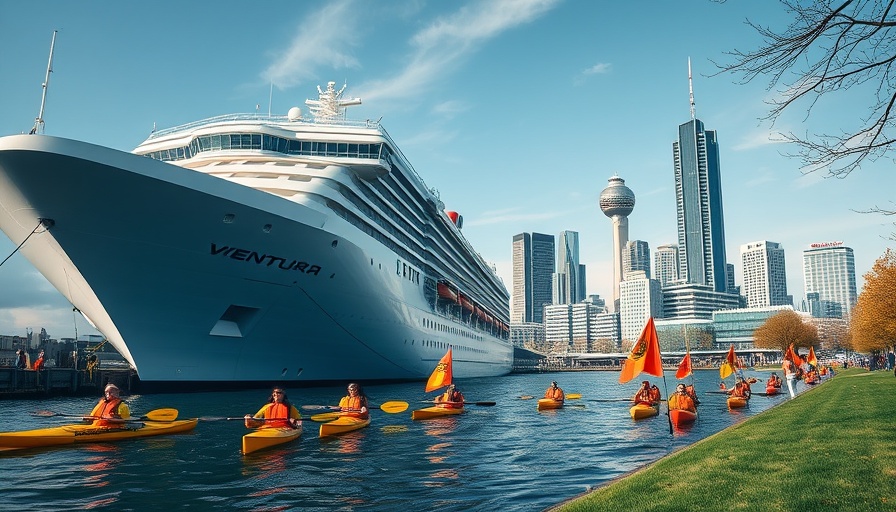
Protest Action Stirs Debate Over Cruise Ship Environmental Impact
On August 24, 2025, a group of 15 Extinction Rebellion activists took to the waters of Rotterdam, attempting to block the docking of P&O Cruises' Ventura. Amid rising concerns about the environmental footprint of cruise tourism, this protest has sparked renewed discussions on the sustainability of maritime travel. Protesters utilized boats and canoes to obstruct the ship's path near Hotel New York, resulting in a half-hour delay before local police intervened and arrested two activists.
What's Behind the Protests?
According to Extinction Rebellion, the Ventura represents a "floating environmental disaster." The organization contends that major cruise lines contribute significantly to pollution and climate change, arguing that the government needs to take firmer action against such vessels. In their social media posts, the protesters stated, "If the government still does not ban cruises, then we will stop them ourselves." This direct action in Rotterdam follows previous disruptions in Amsterdam, where Extinction Rebellion similarly sought to halt the Celebrity Eclipse.
The Case for Stricter Regulations on Maritime Tourism
The impact of cruise ships on ecosystems and local economies is a contentious topic worldwide. While many cities promote cruise tourism for its economic benefits, critics argue that the environmental costs often outweigh financial gains. Cruise ships are notorious for large carbon footprints, waste production, and fuel consumption. According to environmental studies, some cruise ships release pollutants equivalent to millions of cars, raising alarm among local and global environmental groups concerned with climate change.
Global Implications and Emerging Trends in Maritime Travel
The recent protests highlight a growing movement advocating for more sustainable travel practices. As consumers become informed about environmental issues, there is a noticeable shift in travel preferences. The cruise industry, already grappling with its sustainability image, may need to reevaluate its operational practices and impact if it hopes to retain visitors in light of these movements.
Key Takeaways: What This Means for Travelers
For travelers, understanding both the allure and the impact of cruise vacations is essential. While these trips can offer unique experiences, potential tourists may reconsider their travel choices, emphasizing sustainability over convenience. As awareness of climate issues grows, responsible tourism practices will likely shape future vacation planning, prompting a rethinking of traditional cruise travel.
In light of these developments, it’s crucial for prospective travelers to stay informed about both the environmental implications of their choices and the responses from the travel industry itself. As the call for bans on cruise ships in certain regions gains traction, changes might be on the horizon that could redefine how we experience sea travel.
 Add Row
Add Row  Add
Add 




Write A Comment